- You are here:
- Home »
- Oven Recipes
- » The Perfect Salmon Fillet Oven Recipe
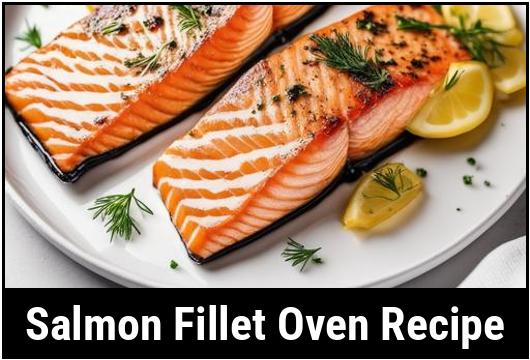
The Perfect Salmon Fillet Oven Recipe
Salmon is a delicious and healthy seafood that can be cooked in a variety of ways. One of the most popular methods of cooking salmon is by baking it in the oven. Baking salmon fillets in the oven is a quick and simple way to prepare a nutritious and flavorful meal that is perfect for any occasion.
The Science of Baking Salmon in the Oven
Before we dive into the specifics of baking salmon fillets in the oven, let’s talk about the science behind it. When salmon is baked in the oven, the heat from the oven causes the protein in the fish to coagulate and solidify. This process is what makes the fish firm and absorbent to any added flavors. The high heat also causes the fish’s natural oils to rise to the surface, creating a delicious golden brown crust.
Selecting the Right Salmon Fillets
The first step to creating the perfect salmon fillet oven recipe is to select the right salmon fillets. When selecting salmon fillets, look for ones that are firm and have a bright, deep pink color. Fresh salmon should also have a distinct ocean smell, which is a sign of its freshness. Ideally, you want to select fillets that are uniform in thickness, so they cook evenly.
Cleaning and Preparing the Salmon Fillets
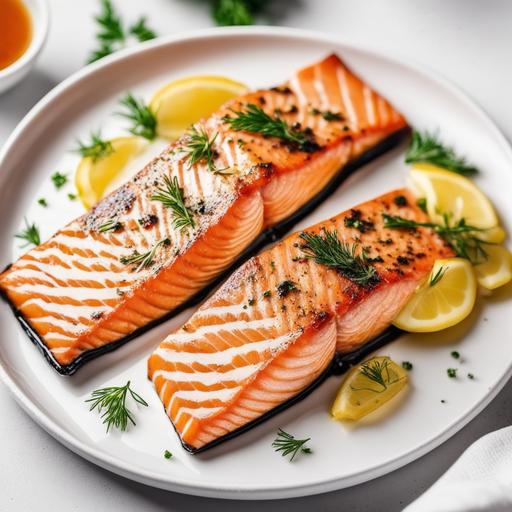
Once you have selected your salmon fillets, the next step is to clean and prepare them for baking. Start by rinsing the fillets under cold water to remove any debris. Then, pat them dry with a paper towel. Remove any visible bones with a pair of tweezers or a knife. Next, season your fillets according to your preference with salt, pepper, or any other spices you choose. If you have the time to marinate your fillets, it will enhance your dish’s taste. You may also add lemon juice to infuse a more citrus flavor into your salmon.
Tips for Baking Salmon Fillets in the Oven
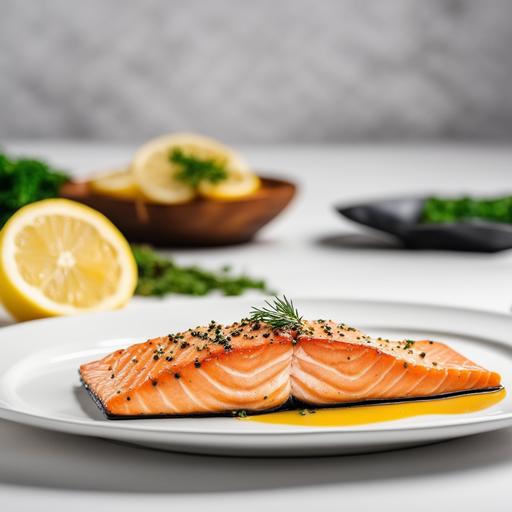
Now that your salmon fillets are seasoned and prepared, it’s time to bake them in the oven. Here are some tips to ensure that your salmon turns out perfect every time:
-
Preheat your oven to 400 degrees Fahrenheit. This optimal temperature is perfect for salmon fillets since it allows the inside to cook evenly while the top gets a crispy crust.
-
Line a baking sheet with aluminum foil and spray with cooking spray. This step will prevent the fillets from sticking and make it easier to clean up later.
-
Place the seasoned and prepared salmon fillets on the foil-lined baking sheet, skin-side down. If your salmon fillets contain skin, it’s actually advantageous to cook them with the skin intact. The skin will help to protect the flesh from high heat, and also when ready, it’s significantly easier to remove than skinless fillets.
-
Do not overcrowd the fillets on the baking sheet. This helps the air to circulate and allows the fillets to cook evenly.
-
Bake the salmon fillets in the preheated oven for 10-12 minutes, depending on the size of your fillets and the desired doneness. Cooked fillets should have a flaky texture because the heat should have evenly spread across the fillet.
How to Check Doneness
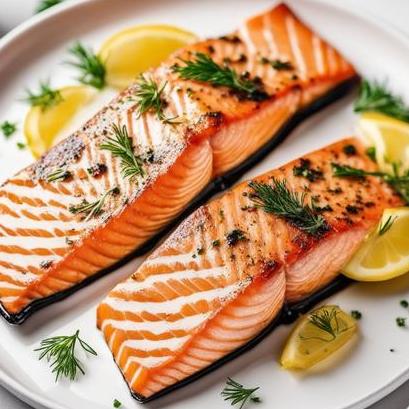
A common issue when cooking salmon fillets is the fear of undercooking or overcooking them. Here are a few ways to check your salmon fillets’ doneness:
-
Flake Test: The flake test is the easiest method to test doneness. Use a fork or knife to gently poke the salmon fillet in the thickest part of the flesh. If it flakes apart easily, it’s cooked perfectly, and you can enjoy a deliciously tender salmon fillet.
-
Temperature Test: Using a thermometer is an accurate way to test the doneness of your salmon fillets. Insert the probe in the thickest part of the flesh, and once the temperature reaches 145 degrees Fahrenheit, the salmon is ready to plate.
Recipe for Salmon Fillets in the Oven
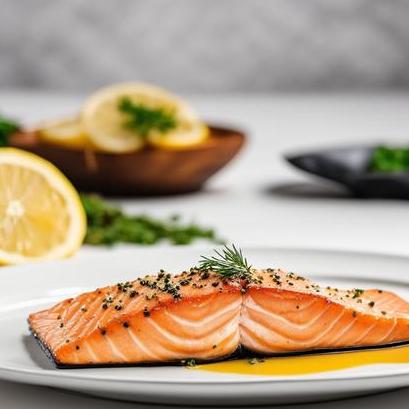
Here is an easy and delicious recipe for salmon fillets in the oven:
Ingredients:
-
4 salmon fillets
-
Salt and pepper to taste
-
2 tablespoons of olive oil or melted butter
-
1/4 cup of fresh lemon juice
-
4 cloves of garlic, minced
-
2 tablespoons of honey
Instructions:
-
Preheat the oven to 400 degrees Fahrenheit.
-
Prepare a foil-lined baking sheet by spraying it with cooking spray.
-
Season the salmon fillets with salt, pepper, and any other seasonings as desired.
-
In a small bowl, whisk together the olive oil or melted butter, lemon juice, minced garlic, and honey.
-
Brush the salmon fillets with the honey garlic mixture, making sure to cover the top and sides evenly.
-
Bake in the preheated oven for 10-12 minutes, or until the fillets are cooked through.
-
Once cooked, remove the fillets from the oven and allow them to rest for a few minutes before serving.
Variations
Adding different herbs and sauces can significantly transform the way your salmon fillet tastes. You may, for instance, use teriyaki sauce instead of honey, or add fresh dill. The options are endless. Be creative, taste and enjoy every process.
Final Thoughts
Baking salmon fillets in the oven is an easy, healthy, and delicious way to prepare a meal that can be enjoyed anytime. The key is to select high-quality salmon fillets, season them well, bake them at the right temperature, and checking for doneness is always important.
Follow the tips outlined in this article, and you will bake the perfect salmon fillets every time. Enjoy!
Sources
FAQS On Salmon Fillet Oven Recipe
How Long Should I Cook Salmon Fillets In The Oven?
To ensure perfectly cooked salmon fillets, preheat your oven to 425 degrees Fahrenheit (220 degrees Celsius). Depending on the thickness of the fillets, cook them for approximately 12-15 minutes. The internal temperature of the salmon should reach 145 degrees Fahrenheit (63 degrees Celsius) when fully cooked.
What Is The Best Way To Season Salmon Fillets Before Baking?
Seasoning the salmon fillets is key to enhancing their flavor. While it depends on personal preference, a simple and delicious way to season salmon is to brush it with olive oil and sprinkle with salt, pepper, and your choice of herbs such as dill, parsley, or thyme. Lemon slices or zest can also add a refreshing touch.
Is It Necessary To Remove The Skin From Salmon Fillets Before Baking?
It is not necessary to remove the skin from salmon fillets before baking. In fact, leaving the skin on can help keep the fish moist and flavorful during the cooking process. However, if you prefer skinless salmon, you can remove it before baking using a sharp knife or ask your fishmonger to do it for you.
How Do I Prevent My Salmon Fillets From Sticking To The Baking Sheet?
To prevent salmon fillets from sticking to the baking sheet, lightly coat it with cooking spray or a drizzle of olive oil. Alternatively, you can place the fillets on a sheet of parchment paper before baking. This will help the salmon slide off the sheet easily and prevent any sticking.
Are There Any Variations Or Additional Ingredients I Can Use For A Salmon Fillet Oven Recipe?
Absolutely! There are numerous variations and additional ingredients you can incorporate into your salmon fillet oven recipe to add extra flavor. Some popular options include brushing the fillets with a honey-mustard glaze, topping them with sliced tomatoes and mozzarella cheese, or marinating them in a teriyaki or citrus-based sauce. Feel free to experiment with different herbs, spices, and sauces to create unique and delicious salmon dishes.


